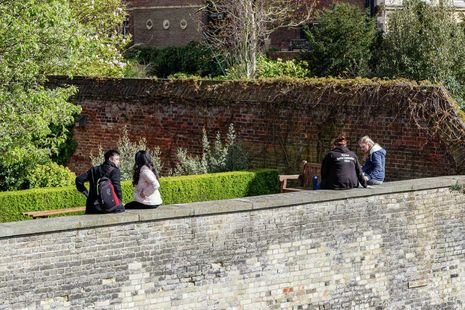Cambridge’s first Foundation Year students: where are they now?
Three students from the Foundation Year’s inaugural cohort reflect on their experiences almost one year on

The Cambridge Foundation Year promises an opportunity for those who have ‘experienced disadvantage in their education and have not had the opportunity to realise their potential’ to prepare to apply for and undertake degree courses at the University and elsewhere. For Amélie, Cameron and Kerrie, first-year degree students from the course’s first ever cohort, the Foundation Year was a rigorous and enriching experience organised by staff with a genuine care for their development and progression.
Each of the students interviewed emphasised the advantages of the interdisciplinary nature of the Foundation, having chosen to progress to courses other than those they had applied to elsewhere. Cameron, who came to the course with an interest in English but now studies History and Politics, was drawn to the Cambridge Foundation for this very reason, as “you weren’t bound to doing a certain subject after finishing the year like you would be at certain other universities”, and referred to the four-stream system of learning as “an interesting concept”. Given the significant number of UK students who change course or leave their degree, among which those from disadvantaged backgrounds are disproportionately represented, perhaps the interdisciplinary model for the Foundation year offers approaches worth considering in higher education more broadly.
“Perhaps the interdisciplinary model offers approaches worth considering in higher education more broadly”
These students also praised the ways in which the Foundation seeks to develop skills in source analysis, highlighting how humanities degrees often expect such expertise without necessarily training students in them directly. For Cameron, “a lot of the skills I developed last year have made me so much more inquisitive about things that aren’t on the reading list”. He feels that “had [he] come straight from school” to Cambridge, he may have found it more difficult to grasp the importance of using sources in his work. Indeed, with the introduction of a new primary sources paper, it seems that the reform of the Cambridge History tripos in 2022 has sought to target the necessity to teach these skills more directly.
Students were predominantly positive in their reflections on the course, and particularly of its well-trained staff and their “highly responsive approaches to feedback”. Students described the confidence they gained from familiarising themselves with the structures of teaching at Cambridge in advance of the degree, enabling them to manage their workload upon arrival and make the most of extracurricular opportunities. While some from the first cohort have reported feeling isolated from their peers on degree, Cameron described being approached by his fellow first-years for advice on the Cambridge supervision system, to which he has been happy to respond with his experiences from the Foundation.
“I became very burnt-out by the intensity”
There did, however, seem to be some discrepancies between the experiences of students, particularly depending on how far different faculties seemed to have understood the ethos of the Foundation. Amélie, who now studies English, found that a Latin paper offered by the Classics Faculty had “a very disproportionate workload to every other paper on the Foundation Year”. Amélie believes this was down to a kind of “misunderstanding between the Classics Faculty and the Foundation Year”, and led her to become “very burnt-out by the intensity” of frequent and strictly enforced deadlines and contact hours.
For Kerrie, on the other hand, the Foundation “felt a lot less intense” than degree as “there was less reading and there weren’t so many essays due every week,” so Kerrie was able to spend more time “getting to grips with” academic expectations at Cambridge. Where Kerrie has encountered some lack of communication, however, is in the difficulties she has found securing continuing support into her degree. While Kerrie found the Foundation Year itself to be “a very supportive introduction to Cambridge life”, she experienced a “big shift” upon starting her degree in HSPS.
As a first-year, she reports failures to organise her a study skills tutor, which has led to her “falling further behind”. Kerrie also noted that while “the Foundation Year staff all seemed to have training and passion for supporting those with educational disadvantages”, support and teaching from the HSPS Department “feels very segregated and quite impersonal”.
“The support and teaching from the HSPS Department ‘feels very segregated and quite impersonal’”
It was clear from speaking with these students that the Foundation Year is run by experienced and supportive staff, who have worked extremely hard to develop an ambitious course to help students prepare for their academic progression and make informed decisions about the directions this might take.
In light of a recent report which found that students from disadvantaged backgrounds are less likely to complete their course than their peers, it seems important to stress that alongside the Foundation Courses that help disadvantaged students access and prepare for undergraduate learning, support systems within degree courses themselves are still in need of reevaluation. To this end, the format of the Foundation, its interdisciplinary approach, and the support it provides should be a lesson in how higher education more generally can improve to fulfil the promises it makes to students – from the skills degree courses propose to offer as well as the future prospects they claim to help students navigate.
 News / Hundreds of Cambridge academics demand vote on fate of vet course20 February 2026
News / Hundreds of Cambridge academics demand vote on fate of vet course20 February 2026 News / University Council rescinds University Centre membership20 February 2026
News / University Council rescinds University Centre membership20 February 2026 News / Judge Business School advisor resigns over Epstein and Andrew links18 February 2026
News / Judge Business School advisor resigns over Epstein and Andrew links18 February 2026 News / Petition demands University reverse decision on vegan menu20 February 2026
News / Petition demands University reverse decision on vegan menu20 February 2026 News / Caius students fail to pass Pride flag proposal20 February 2026
News / Caius students fail to pass Pride flag proposal20 February 2026










